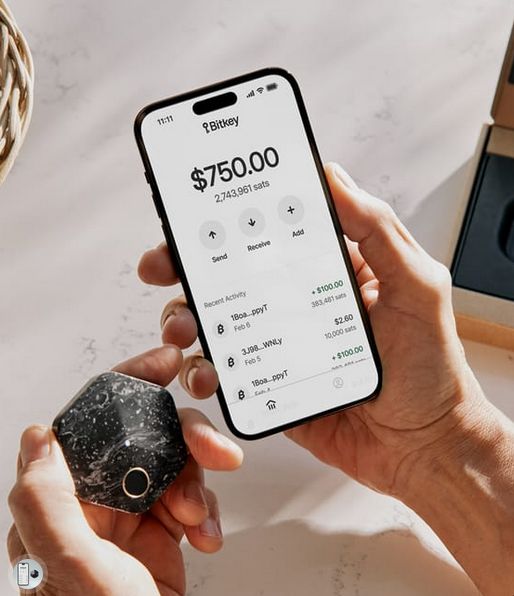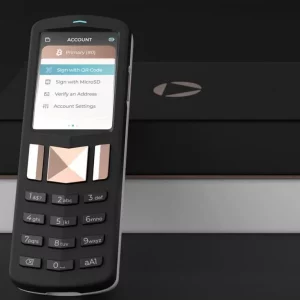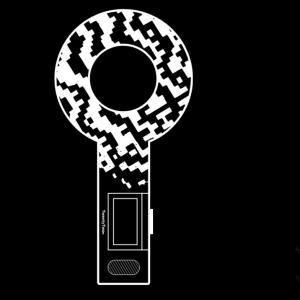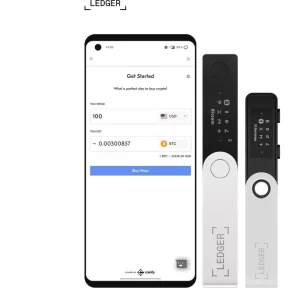

What is Bitkey Wallet? [Bitkey Review 2024]
140,00 €
Bitkey is an open source hardware wallet designed to simplify Bitcoin security. It combines a mobile app, a hardware device, and a recovery system to keep your Bitcoin safe and accessible.
Description
Launched in December 2023 by Block (formerly known as Square, the company behind Cash App), Bitkey is an open source hardware wallet designed to simplify Bitcoin security. It is a multisig wallet combining a mobile app, a hardware device, and a recovery system to keep your Bitcoin safe and accessible.
A standout feature is Bitcoin inheritance planning, launched in November 2024, ensuring your Bitcoin is passed on securely to designated beneficiaries. This feature solidifies Bitkey’s appeal to those prioritizing long-term wealth preservation and control.
4 Things to Be Aware of Before Buying Bitkey
- Centralized Server Concerns: Bitkey’s Server Key is hosted on Block’s servers, raising concerns among some users about potential security vulnerabilities and the reliance on a third-party service for critical functions.
- Complex Recovery Process: If you lose your hardware device, the recovery process involves a 7-day waiting period and may require assistance from trusted contacts, which could be cumbersome for some users. If Bitkey goes out of business, the “break glass” recovery method may be complicated for beginners.
- At present, Bitkey wallets can only be restored on another Bitkey device and are not compatible with other wallet platforms, as they do not support the BIP-39 standard for mnemonic seed phrases.
- Higher Price Point: At $150 USD, Bitkey is priced higher than some established competitors, which could deter budget-conscious buyers looking for more affordable hardware wallet options.
How Bitkey Works
Bitkey uses a three-key system: Mobile Key, Hardware Key, and Server Key.
- Mobile Key: Installed on your phone, this key initiates and signs everyday transactions up to a limit you set. It’s backed up securely in the cloud (e.g., Google Drive or iCloud) for recovery in case you lose your phone.
- Hardware Key: This hardware wallet protects your larger Bitcoin holdings. It co-signs transactions exceeding your mobile limit, approves security changes, and authorizes recovery processes. It connects securely to your phone via NFC, eliminating the risk of plugging it into a potentially compromised computer.
- Server Key: This plays a crucial role in recovery. It can co-sign transactions up to your mobile limit and helps retrieve your funds if you lose both your phone and hardware key. However, it cannot bypass your hardware key for spending or initiate recovery on its own.
The hardware key uses your fingerprint for secure access and connects to your phone via NFC. This eliminates the need for a computer connection and reducing potential vulnerabilities. Larger transactions require both the mobile and hardware key for approval, meaning even unauthorized phone access cannot compromise your Bitcoin.
Unlike traditional hardware wallets that require memorizing complex seed phrases, Bitkey eliminates this burden. You only need a PIN to unlock the hardware key (fingerprint unlock is also an option). Additionally, you only provide basic information like email and phone number during setup, minimizing the amount of personal data stored.
Bitkey’s Mobile Pay feature offers a unique way to make everyday transactions directly through the app, without needing your hardware device for every single approval. To use Mobile Pay, you simply set a daily spending limit. Transactions under this limit will be authorized by the app itself. Any transaction exceeding your daily limit, however, will require verification from your hardware device for an extra layer of security. Importantly, these hardware-approved transactions won’t count towards your daily mobile limit. Keep in mind that Mobile Pay needs to be manually activated within the Bitkey app before you can enjoy this convenient feature.
Furthermore, Bitkey connects to Block’s payments platform Bitcoin Cash App and Bitcoin exchange Coinbase to allow buying and selling Bitcoin within its app.
Read also: Bitkey vs Trezor or Bitkey vs Ledger
Bitkey’s Bitcoin Inheritance
Bitkey’s inheritance feature allows you to designate a beneficiary who will receive their Bitcoin holdings upon your passing. Here’s how it works:
- Setup: The Bitkey app enables you to assign a beneficiary, who must have a Bitkey wallet (including the hardware device and app). Beneficiaries can be added, updated, or removed at any time. Importantly, they won’t have visibility into the wallet’s holdings.
- Claim Process: Beneficiaries can initiate an inheritance claim after the wallet owner’s passing. A 6-month waiting period provides a safeguard against fraudulent claims, during which the owner receives alerts and can cancel the claim if necessary.
- Funds Transfer: After the waiting period, the funds become available for transfer to the beneficiary’s Bitkey wallet, ensuring a smooth and secure process.
Is Bitkey Open Source?
Bitkey recently opened up the source code for all its core components. This includes code for the hardware device, mobile app, server, and even the electrical designs. With this open-source approach, anyone can now examine the code behind Bitkey and see exactly how it works. This allows the community to verify that Bitkey doesn’t have any hidden functionalities that could compromise user funds.
Furthermore, anyone can build the mobile app from scratch using the provided code (“reproducible builds”), essentially double-checking that the code on Github matches the actual Bitkey app. This openness also encourages collaboration on security. Anyone who discovers a security vulnerability can report it to Bitkey, and expect a thorough investigation and a public patch to address the issue.
However, the code is released under a specific license with limitations. It uses the Commons Clause, which restricts how others can use the code. You can freely tinker and use it for non-commercial purposes, but creating commercial products or services based on the code requires special permission from Bitkey.
Bitkey Fees
Bitkey keeps you in control of transaction fees. They transparently show you the fees upfront so you can choose the speed and cost that best suits your needs. Transaction fees are directly tied to speed. The faster you want your transaction confirmed, the higher the fee you’ll need to pay. Bitkey offers three transaction speed options: Priority (taking approximately 10 minutes), Standard (around 30 minutes), and Slow (roughly 60 minutes). They will only display the options available based on your current balance to cover the associated fee. Even after sending a transaction, if the network gets congested and confirmation takes longer than expected, you can still utilize the Replace-by-Fee feature to speed it up.
Is Bitkey Safe and Secure?
You can set up trusted contacts who can assist with recovery if you lose your phone or hardware. Additionally, the mobile key is encrypted and backed up to the cloud (Google Drive or iCloud). This allows you to recover your wallet on a new phone if needed. For hardware loss, Bitkey uses a 7-day security waiting period to prevent unauthorized access. You can then pair a new hardware device and transfer your funds. Trusted contacts can expedite this process for faster recovery.
However, its fingerprint reader has some limitations. For example, damaged or injured fingers might not be recognized by the sensor, potentially hindering access to your funds. According to an email from Bitkey customer support shared with the H17N, the ability to add more fingerprints for family access to your Bitkey device will be available soon.
With two of the three keys in your possession (mobile and hardware), you maintain complete control over your Bitcoin. Transactions require your approval, and you can recover your funds even without access to the server key (though it simplifies the process). The wallet allows you to set spending limits for the mobile app for convenient everyday transactions, while keeping the majority of your Bitcoin secure on the hardware key.
One of Bitkey’s features we found unique about Bitkey, in terms of empowering users with true ownership and control over their funds, is the distribution of keys across multiple devices and platforms to minimize the risk of single points of failure and unauthorized access.
Bitkey acknowledges that situations might arise where using Block’s servers becomes undesirable. Perhaps Block goes out of business, you lose trust in their software security, or the app is no longer available in your region due to regulatory restrictions. To address these scenarios, Bitkey incorporates a “break glass” functionality detailed in their recovery whitepaper. This method allows you to regain access to your Bitcoin even if you cannot use the Bitkey app or server key. However, it’s important to understand that the break glass method is a complex procedure designed for emergencies and can be a complex process for most beginners.
Unlike most hardware wallets, Bitkey has no screen or buttons and no computer is required to use it. It relies heavily on its mobile app for user interaction. Less physical components potentially mean fewer vulnerabilities. There’s no screen to display sensitive information or buttons that could be tampered with.
Additionally, the inability to recover wallets on non-Bitkey platforms due to the lack of BIP-39 support is a limitation.
Bitkey Wallet: Our Verdict
Our Take:
- Security & Self-Custody Trade-offs: Bitkey’s three-key system enhances protection, but reliance on Block’s server key raises concerns for users who prioritize full self-custody. Additionally, the lack of a display means transactions cannot be verified independently of a smartphone.
- Ease of Use & Recovery: The wallet simplifies Bitcoin management with mobile integration, fingerprint security, and no seed phrase memorization. However, the recovery process can be complex, requiring a 7-day wait and specific hardware.
- Cost: Priced at $150, Bitkey is more expensive than some alternatives like Blockstream Jade and Trezor Model One.
Bitkey offers a new and unique feature set for users seeking a user-friendly, secure, open source Bitcoin hardware wallet. Its unique three-key security system enhances protection. The mobile app integration simplifies Bitcoin management, while fingerprint security and offline storage on the hardware key reduce attack vectors. Multiple recovery options, including encrypted backups and trusted contacts, provide flexibility. Plus, you avoid the complexity of memorizing seed phrases. The addition of inheritance planning solidifies its position as a wallet not just for today but for future generations.
While Bitkey’s server key offers a convenient way to recover lost funds, its centralized location on Block’s servers raises concerns for some users. They might see this as contradicting the core principle of self-custody in Bitcoin, where users hold their own keys. For those seeking a completely self-custodial solution where no third party holds any keys, Bitkey might not be the ideal choice.
However, some users might see it as a practical compromise. It offers a self-custody solution for people who are concerned about safely storing their own keys, especially beginners, but don’t want to completely cede control to a third party. Notably, Bitkey’s server key cannot spend your Bitcoin without the other two keys under your control. Additionally, Bitkey’s recovery process can be complex, especially for lost hardware. The 7-day waiting period and potential involvement of trusted contacts could be a hurdle for some. Currently, you can only restore your Bitkey wallet on another Bitkey device; it cannot be restored on a different wallet.
At $150 USD, Bitkey enters the hardware wallet market with a higher price point compared to some established competitors such as Blockstream Jade or Trezor (Trezor Model One). This might be a deciding factor if you are looking for a more budget-friendly option.
On the other hand, Bitkey’s integration with Cash App and Coinbase is a plus for users who want to buy and sell Bitcoin directly within their wallets. However, this integration might not be ideal for those who prefer a hardware wallet independent of any specific exchange or platform. Moreover, some users have complained of higher fees when buying Bitcoin within the app. Since it launched in December 2023, Bitkey is a relatively new product lacking the long-term security track record of more established hardware wallets.
Additional information
| Bitcoin Only | |
|---|---|
| Source Code | |
| Multisig | |
| NFC | |
| Replace by fee (RBF) | |
| BIP39 Support | |
| Physical Keypad | No |
| USB-C Connector | Yes |
| Mobile App | Yes |
| Operating System (OS) | |
| Built-in Exchange | |
| Year Launched | 2023 |
| Headquarters | United States |













Reviews
There are no reviews yet.